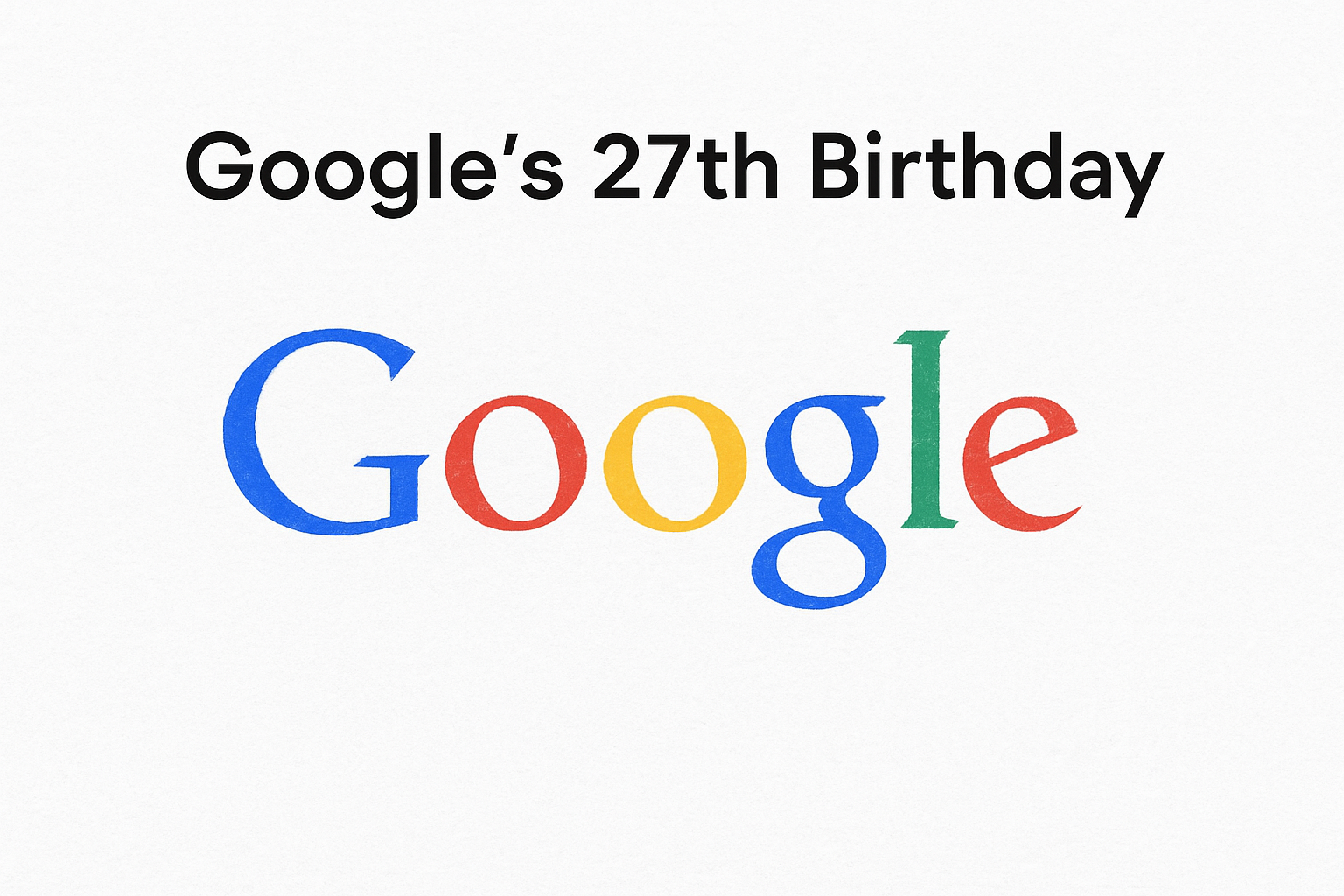Google’s 27th birthday marks not only a milestone in tech innovation but also serves as a lens through which we can examine the evolving legal and regulatory challenges in the digital era. From its humble beginnings in a Menlo Park garage to becoming a global powerhouse under Alphabet Inc., Google’s journey highlights the intersection of innovation, intellectual property, and regulatory compliance.

The Origins of Google and Its 27th Birthday Celebration
Founded in 1998 by Larry Page and Sergey Brin, Google aimed to “organize the world’s information and make it universally accessible.” On Google’s 27th birthday, the company released a nostalgic homepage Doodle featuring its original 1998 logo, celebrating decades of innovation while subtly highlighting the evolution of its intellectual property.
This Doodle not only evokes nostalgia but also raises awareness about copyright and trademark protections, reminding users that even playful designs have significant legal considerations.
Key Legal Implications Surrounding Google’s Growth
Intellectual Property and Google’s 27th Birthday
Google’s expansion into search, AI, YouTube, Android, and cloud computing has inevitably led to intellectual property disputes. The 1998 logo Doodle illustrates how companies must protect legacy content while navigating copyright laws in the digital space.
Data Privacy and Regulatory Compliance
Handling billions of user queries daily places Google at the center of global privacy regulations. On Google’s 27th birthday, it’s worth reflecting on legal frameworks such as GDPR and CCPA, which govern how companies must protect personal data, obtain consent, and provide transparency.
Antitrust Considerations
Google’s market dominance has prompted scrutiny under antitrust law in both the United States and Europe. The celebratory Doodle subtly reinforces the company’s brand authority, but it also reminds legal scholars of ongoing debates over monopoly practices and competitive fairness in tech markets.
AI and Algorithmic Transparency
As Google advances in AI and machine learning, the legal landscape grows increasingly complex. Google’s 27th birthday serves as a moment to consider whether algorithms should be subject to disclosure rules to ensure transparency, fairness, and accountability.
How Google’s 27th Birthday Connects to Intellectual Property Law
Doodles, like the one released for Google’s 27th birthday, are legally recognized as creative works. By showcasing its original 1998 logo, Google reaffirms ownership of its intellectual property, offering a case study for how companies can protect, monetize, and legally leverage historical content in the digital age.
This intersection of celebration and legality highlights the broader implications for tech companies, including:
-
Trademark rights protection
-
Employee-created work ownership
-
Enforcement of copyrights in global jurisdictions
Conclusion
Google’s 27th birthday is more than a corporate celebration. It serves as a reminder that technological innovation and legal frameworks are inseparable. Intellectual property, privacy law, antitrust considerations, and algorithmic accountability are all integral to Google’s past, present, and future.
For legal scholars, policymakers, and tech enthusiasts, Google’s journey exemplifies how regulatory compliance and strategic innovation must coexist. The 1998 logo Doodle on Google’s homepage is a symbol not only of nostalgia but also of responsible corporate governance and the legal foundations that support a tech giant’s growth.
FAQs
What is the significance of Google’s 27th birthday?
Google’s 27th birthday celebrates the company’s founding in 1998 and highlights its journey from a garage startup to a global technology leader.
Why did Google feature the 1998 logo in its Doodle?
The Doodle commemorates Google’s history while emphasizing its intellectual property and creative legacy.
How does Google’s growth relate to legal issues?
Google faces ongoing challenges in privacy, data protection, copyright, AI transparency, and antitrust law.
What can tech companies learn from Google’s 27th birthday?
It demonstrates the importance of protecting intellectual property, complying with global regulations, and considering legal implications in branding and technology innovation.

